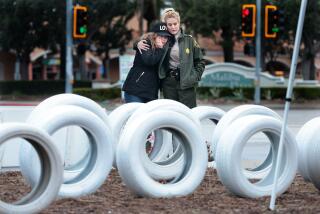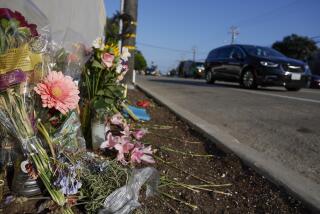Signs for accident victims opposed
- Share via
SACRAMENTO — The message of the proposed freeway signs doesn’t seem controversial, memorializing individuals killed in traffic accidents and urging California motorists to drive safely.
But a proposal to allow families to pay the California Department of Transportation to put up dozens of such signs along state highways has been caught up in a revolt by environmentalists against what they see as the growing clutter of signs and billboards along California roadways.
The latest flare-up involves plans to expand a program that allows families to pay $1,000 to cover the cost of signs that read, “Please Don’t Drink and Drive -- In Memory of . . .” and then give the victim’s name.
The Caltrans program, which started in 2002, has so far put up 46 memorial signs for victims of drunk-driving accidents on California freeways and highways. Assemblywoman Jean Fuller (R-Bakersfield) was the author of a bill to expand it to those killed in accidents not involving drugs or alcohol. Fuller was moved by a series of fatal accidents on a road near Taft, southwest of Bakersfield, that killed several people.
Backers of the plan, which has been approved by the Assembly and awaits action by the Senate, say it would reduce the risk to grieving families who brave traffic to create and visit unofficial roadside memorials of flowers, photos and candles.
The unsanctioned memorials, they say, also create risks for Caltrans workers who have to repeatedly remove them. The proposed signs would address that problem, Fuller said.
“It gives grieving families comfort, and the message of driving safety is always important,” she said.
Anti-billboard activists, however, warn that the signs could distract drivers, potentially causing more accidents.
“Our highways are not intended to be repositories for memorials,” said Mary Tracy, president of Scenic America, a group that advocates against unnecessary signage. “A clutter of signs is the last thing we need along our roadways.”
Critics of the bill also note that California already has dozens of signs that name freeway interchanges and bridges in honor of CHP officers and state engineers who have died. The state also has posted hundreds of “Adopt-A-Freeway” signs advertising that an individual or company is sponsoring cleanup of a stretch of freeway.
And the latest proposal comes as Caltrans is considering a plan to allow commercial advertisements on hundreds of electronic message boards along freeways that are normally used for Amber Alerts and warnings of road hazards.
“There is a question of cluttering up freeways with too much signage,” said Dennis Hathaway, president of the Coalition to Ban Billboard Blight. “I think there probably is a tipping point.”
A legislative bill analysis, noting that thousands of people are killed on California highways each year, says the proposal “could result in a flood of applications for memorial signs, creating significant workload for Caltrans and adding to driver distraction.”
In response to concerns, Assembly members amended the bill to limit the number of new non-DUI memorial signs statewide to 20 a year. With each sign staying up for no more than seven years, the most up at any time would be 140.
A Caltrans study found that the number of alcohol-related fatalities in the 16 counties where memorial signs had been erected decreased from 789 in the three years before the signs went up to 710 during the three years afterward. But the analysis could not determine if the drop was related to the memorial sign program.
Los Angeles resident Jane Guth Parks said she believes the signs make a difference.
In 1996, a drunk driver killed four of her family members, including her parents, on Lincoln Boulevard in West Los Angeles. Parks’ family started out putting flowers on the roadside near the accident scene in the area now known as Playa Vista. They were one of the first to get Caltrans to put up a memorial sign.
“It’s a great feeling for me,” she said of seeing the sign bearing her relatives’ names. “Hopefully it means they will not be forgotten. If it influences one person to take precautions, to get a designated driver, or not to imbibe themselves, the sign has done its job.”
--
More to Read
Sign up for Essential California
The most important California stories and recommendations in your inbox every morning.
You may occasionally receive promotional content from the Los Angeles Times.











